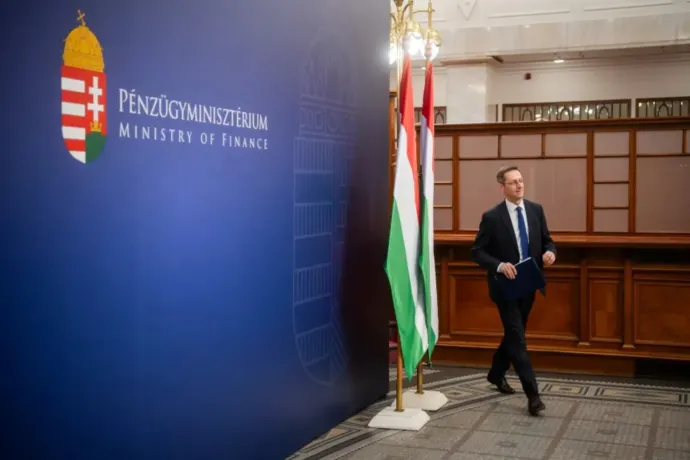Orbán chose a stable ally as the next Governor of the National Bank

At Thursday's cabinet briefing, Gergely Gulyás, Minister of the Prime Minister's Office, had already hinted that Viktor Orbán would announce the new Central Bank Governor in his usual Friday morning radio interview. This has now been done, and the Prime Minister said of the decision:
Among the many good economists, he tried to find the most experienced and the calmest one, who also has practical experience, "who is no rookie, has seen it all and has, so to say, smelled gunpowder in the most difficult situations".
That's how he chose Mihály Varga, Minister of Finance. The forint reacted well to the announcement gaining strength, indicating that market does not see the future Central Bank Governor as a risk to the Hungarian economy. Meanwhile, Márton Nagy, the Minister of National Economy, who has long had a bad relationship with his former boss György Matolcsy, the departing governor of the Central Bank, also spoke out on the issue, saying Varga's nomination will finally "move the relationship between the government and the Central Bank out of its low point".
Orbán's speech at the civic picnic in Kötcse already revealed that the government will merge the Ministry of National Economy, which is in charge of organising the economy, and the Ministry of Finance, which is in charge of the budget, and appoint a top minister for the economy to head the new ministry.
The Prime Minister also said that the choice of the new top minister "is linked to the decisions the regrettable vacancy of the post of Central Bank Governor from 1 March will force the government to take. "Obviously, whoever goes there cannot be this top minister, to put it simply. One will be the top Economic Minister and the other will be the Central Bank Governor."
Although Orbán did not specify which of the two ministers involved in the reorganisation, Mihály Varga, who heads the Finance Ministry, and Márton Nagy, who heads the Ministry of National Economy, would be appointed to which position, the Hungarian economic elite quickly became convinced that Márton Nagy would be given the leadership of the new top Economic Ministry, while Mihály Varga would take over the position of Central Bank Governor from György Matolcsy, who leaves on 1 March.
Even a loyal ally can become too independent
Of the two ministers, Mihály Varga is, in many ways, the more logical choice for Viktor Orbán. Although Márton Nagy has more monetary experience as a former National Bank employee and Vice-President, he is much more confrontational which makes him a much less acceptable candidate than Varga in the eyes of the markets in this fragile situation of the forint and at a time of high Hungarian public debt. Even more important is what Viktor Orbán himself wants.
From György Matolcsy's term as Governor of the Central Bank the Prime Minister has learned that if he releases a previously very loyal lieutenant from his direct control, i.e. he is no longer a member of the government but the head of the Central Bank, even a former loyal ally can easily become "too independent" for his taste. Roughly since the end of the coronavirus epidemic Matolcsy has repeatedly voiced very sharp criticism of the government's economic decisions, saying in December 2022 that the Hungarian economy was close to a crisis and in September this year that the Hungarian economic leadership completely lost track. Orbán would certainly prefer a central bank governor who would retain his loyalty even if he were to move into the more independent arena of the Hungarian National Bank.
Mihály Varga has been with Orbán for decades, Márton Nagy only for a few years, and if you have to weigh up which of them has the bigger ego, which of them might follow separate paths in an independent position, Varga comes out on top for Orbán as the less risky option.
It's fine as long as the central bank and the economic government don't agree on everything
It is quite obvious that there is currently a tension between fiscal and monetary policy regarding the most important things to do for the economy. The tension basically stems from the fact that while the National Bank says that patience, certainty and low inflation are needed to get the economy growing, the Ministry of National Economy says that the approach of the National Bank is too cautious, that there is no risk of inflation and that the economy could be better stimulated. At the moment, this is mainly reflected in the fact that the central bank wants to keep the base rate at 6.5% in the long term while the NGM would like to keep stimulating, and therefore is shocked by this interest rate.
When the confrontation reaches a public give-and-take, it is of course a problem because it sends the wrong message outwards from Hungary, but at the same time, the confrontation is now a good thing in the sense that
the collision of fiscal and monetary governance provides a kind of balance in the economy.
This may be the biggest risk for Varga's central bank governorship: based on his previous government activities (for example, seeing the budget regularly slipping away), he may not be able to resist the growth-oriented government momentum led by Márton Nagy.
If, as a consequence, from March the National Bank were to suddenly start supporting the high-pressure economy that the Ministry of National Economy has frequently emphasised, the forint exchange rate could be a victim of this. There is therefore a risk in the future that no one will try to limit the government's stimulus plans in a sensible way.
If you want to make sure not to miss quick, accurate and impartial news from Hungary in the future, subscribe to the Telex English newsletter!